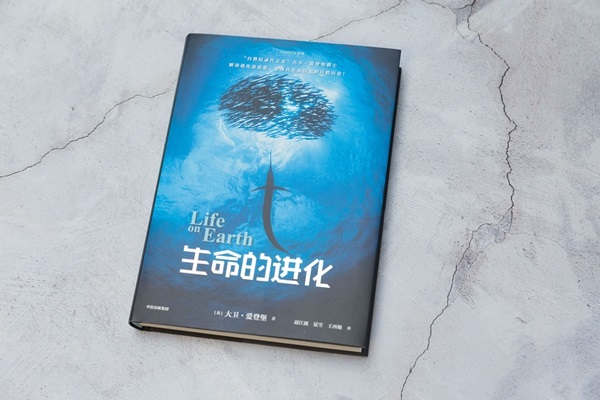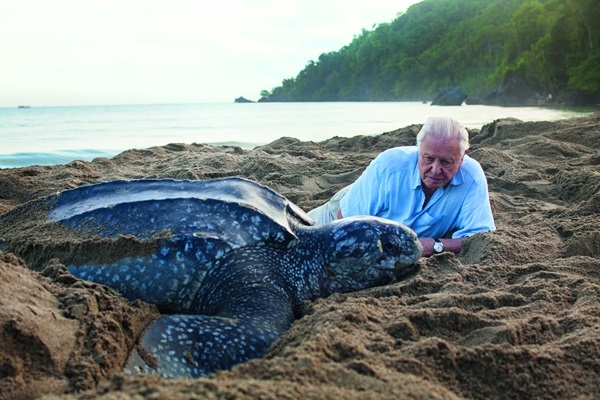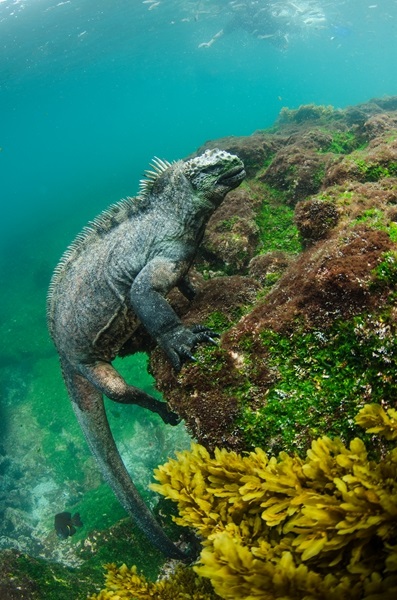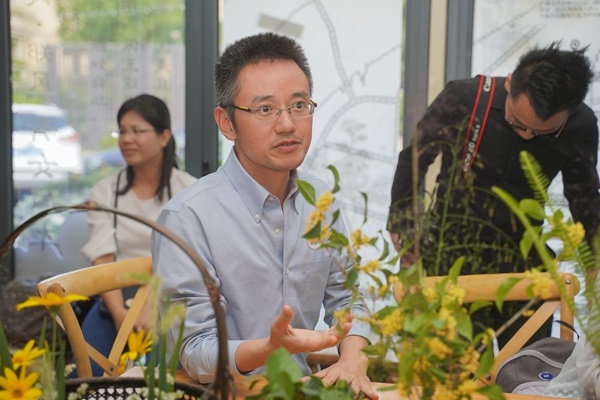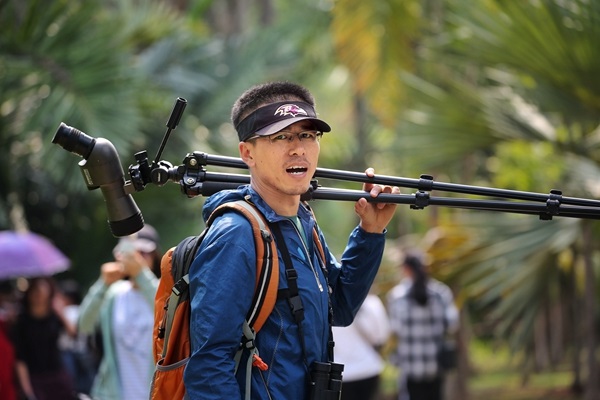| About Us |
| News |
| Announcement |
| Research |
| Conservation & Horticulture |
| Public Education |
| Graduate Study |
| Scientist |
| International Cooperation |
| Resources |
| Annual Reports |
| Publications & Papers |
| Visit XTBG |
| Societies |
| XTBG Seminar |
| Open Positions |
| 4th XSBN Symposium |
| CAS-SEABRI |
| PFS-Tropical Asia |
| Links |
| Location:Home > Public Education > Popular Science |
| A natural storyteller |
|
The book cover of the Chinese-language Life on Earth.[Photo provided to China Daily] To mark the 40th anniversary of David Attenborough's influential book, Life on Earth, a revised and updated edition has been translated for Chinese readers, Li Yingxue reports. In 1979, BBC's nature documentary Life on Earth showed an unforgettable encounter between the doyen of wildlife broadcasting, David Attenborough, and a troop of Rwandan mountain gorillas. It became an iconic moment for millions of television viewers. The documentary and the accompanying book fundamentally changed people's view of, and interaction with, the natural world, as well as helping to cultivate a generation of nature lovers. To celebrate the 40th anniversary of the book's publication, Attenborough has produced a revised version of Life on Earth, updating and adding to the original text, as well as taking into account the latest science and global discoveries that have further illuminated and amplified the history of nature. He also selected new, beautiful photography to better illustrate the book. "We would try to survey the whole animal kingdom and consider each great group of animals in the light of the part it has played in the long drama of life from its beginnings until today," the author writes.
David Attenborough with a leatherback turtle in Trinidad and Tobago, in a photo taken by Gavin Thurston.[Photo provided to China Daily] The Chinese version of the revised edition has been published this month by China CITIC Press Group and Chinese National Geography Books. The translation has been done by three nature lovers who have, over the period of six months, translated the book in their spare time. They are Zhao Jiangbo and Xia Xue, both of whom work at the Xishuangbanna Tropical Botanical Garden of the Chinese Academy of Sciences, located in Yunnan province, and Wang Ximin, who works at the Shanghai Chenshan Botanical Garden. "Sir David Attenborough has been my idol since college, and I've watched his documentaries multiple times," 34-year-old Xia says. "It's such an honor to translate a book of his." Attenborough has presented nine documentaries of his Life series on BBC, including Life on Earth, The Life of Birds and Life in the Undergrowth. His latest documentary is Seven Worlds, One Planet, which was released in 2019. At the age of 94, he still shows no signs of slowing down and his lifelong commitment to teaching people about the wonders of the natural world continues unabated.
Amblyrhynchus cristatus (iguana) in Galapagos, Ecuador, in a photo taken by Sinclair Stammers.[Photo provided to China Daily] "As a fan of nature-themed documentaries, I'm as familiar with Attenborough's voice as I am familiar with that of Zhao Zhongxiang, who hosted the Chinese Animal World documentaries," Xia says. Compared to other books about evolution she read, Life on Earth tells a consistent story with a clear view of how animals and plants evolve and adapt to their environment, according to Xia. "Such a consistent storytelling approach has made it easier for readers to understand the science of evolution," she adds. The book has 13 chapters, telling stories from the infinite variety of flora and fauna to the way animals communicate. The book is worth reading multiple times, Xia claims. "As for myself, I was inspired to study more about the effects of continental drift on animals and plants," she says, adding that the book also encouraged her to study the environment and biodiversity in Xishuangbanna.
The Chinese translators of the book Wang Ximin.[Photo provided to China Daily]
"When people know more about a place, they will cherish and protect it," Xia says. Attenborough also hopes the book will improve people's awareness about protecting the Earth. "We depend on the natural world for every mouthful of food we eat and every lungful of air we breathe," he writes. "It is now up to us to care for the planet and for all the other creatures for whom it is home." Wang, 45, a bird lover, thinks a good book, just like a good speech, can inspire people. Wang himself often gives lectures introducing birds and plants. "The essence is not only to provide knowledge, but also to motivate the listener into wanting to learn more, and Life on Earth succeeded in doing just that," Wang says. He believes that popularization of science relies not on how splendid the story is, but by showing people why they should do something and inspiring them to take action. Wang is responsible for translating the first four chapters of the book, and one difficulty for him was finding the Chinese names for things mentioned in the book.
The Chinese translators of the book Xia Xue.[Photo provided to China Daily] "Attenborough's words are simple but precise, which is quite readable for the public without any specialized terms, so when we translate, we want to keep the essence," Wang says. Zhao, 37, was also quite impressed by the fluent writing style of Attenborough when he translated the book. "I recommend that my friends who like the Chinese version of the book to also read the original one as his writing is so beautiful," he says. As well as translating high-quality international books for the popularization of science, the next step is to write original content about the biodiversity in China, he adds. "As the biological resources in Xishuangbanna are quite abundant, we are planning to write a manual illustrating the nocturnal creatures here, as we have been collecting photos and information from our tropical botanical garden for a couple of years," Zhao says. He explains that night tours of the garden are popular because people can see many natural sights that are not available during the day, such as the breeding of flying frogs and the fireworms. "We hope to attract more people to visit at night and explore the beauty of nature by themselves," Zhao says.
The Chinese translators of the book Zhao Jiangbo.[Photo provided to China Daily] Attenborough still clearly remembers the very first time he visited the tropics-stepping off the plane and into the muggy, perfumed air of West Africa, he says, was like walking into a steamy laundry. Wang Yuheng, a celebrity well-known among Chinese nature lovers thanks to his knowledge of nature and science, says he loved reading the book and went to some of the places mentioned in it. He also encourages more people to follow suit to have a deeper understanding of nature. Shu Degan, a paleontologist and academician of the Chinese Academy of Sciences, says the book tells its stories in a simple and entertaining way. Shu says: "When we see each phase of natural history, we can appreciate both the greatness of evolution and how lucky and how hard it was for us to evolve into humans!"
URL: http://global.chinadaily.com.cn/a/202004/22/WS5e9f8ef2a3105d50a3d17da7_1.html |
| Appendix Download |
|
|
